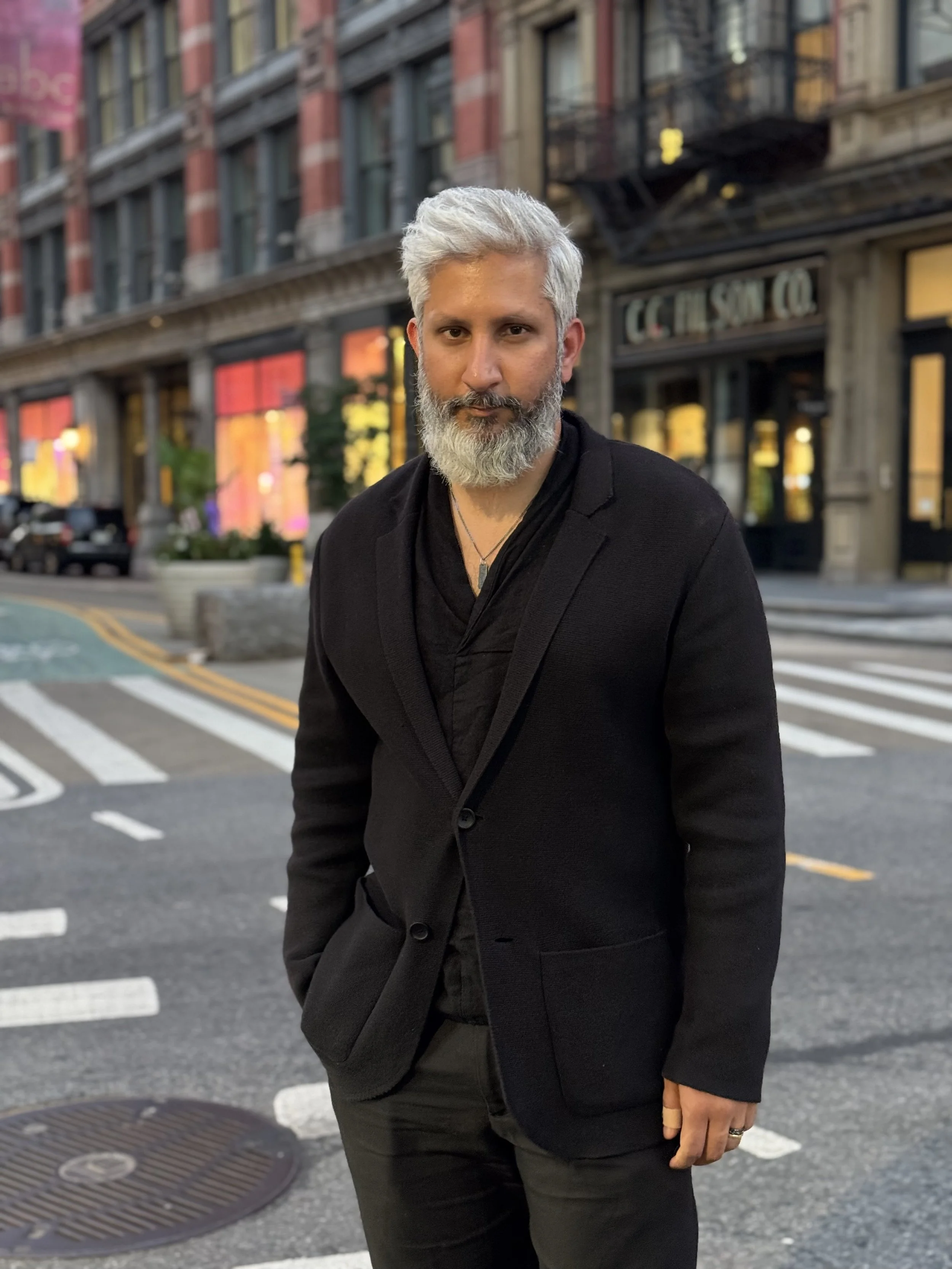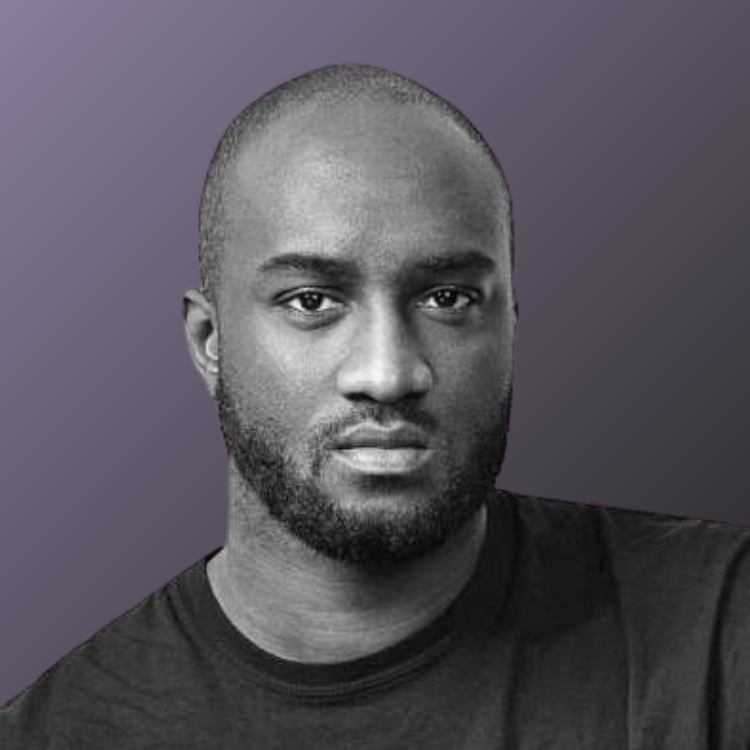Leadership
-

Abeer Desai
Co-Founder, CEO & Creative DirectorAbeer launched Numinous Realm in 2016 as a research project while on leave from CIIS to deepen into the Jupiter-Uranus-Pluto alignment that was coming into orb later that year. This vision grew out of his graduate school research, where he studied with Dr. Richard Tarnas and Dr. Stanislav Grof. Abeer believed the scale of the discoveries by Tarnas, Grof, and their predecessors would spawn entirely new industries and transform the global cultural landscape.
His initial research involved applying Tarnas’ psycho-historical analytical method to aesthetic cycles in 20th-century fashion, which evolved into a fashion project involving designers from leading European fashion houses and American design schools. He also spent several years as a painter, developing an original fusion of archetypal cosmology and New York Abstract Expressionism—with paintings sold to collectors globally.
While at WeWork Labs in Silicon Valley, which included mentorship from a former VP of the early Python Programming Language team at Google and a former VP at Stanford University’s StartX Accelerator, Abeer developed the initial prototype of the HistoryEngine platform, which continues to serve as the bedrock of R&D at Numinous Realm. He has also developed applications of archetypal cosmology in enterprise branding projects and financial market analysis. His ongoing research bridges the work of Dr. Stanislav Grof, Dr. Richard Tarnas, and Joseph Campbell into a new general theory of cosmic evolution.
Abeer’s creative interests lie in bridging the values of fine and pop art, as well as exploring the archetypal foundations of film. Born a Hindu, he has deeply explored spiritual development through a variety of approaches including Vipassana, Holotropic protocols, Krishnamurti, 12 Step, and Christianity. He was born in New Delhi and is a citizen of Singapore, where he was commissioned as an Infantry Officer out of SAFTI Military Institute and served as a Boot Camp Platoon Commander for multiple batches of young Singaporean men evolving from civilian to private.
Prior to founding Numinous Realm, Abeer ran a global branding boutique, working with clients across a wide range of industries in North America and Asia. For his first role out of undergrad, he turned down a job offer from JP Morgan Chase in Manhattan to work in the tribal villages of Machur in South India. There, he collaborated with Indian industrialist Dr. Sudarshan Maini, rural development veteran Ganesh Shenoy, and organic farming pioneer Vivek Cariappa to bring a Gandhian model of self-sufficient economic development to the tribal communities near Nagarhole Tiger Preserve.
He holds an M.A. in Philosophy, Cosmology, and Consciousness from CIIS, where he founded Impact@CIIS—the world’s first student group bridging transpersonal philosophy with commerce—and a B.S. in Economics from NYU Stern, where he led multiple teams to school-wide competition victories and was selected for the inaugural World Studies Track program which included onsite coursework in London, Shanghai and Buenos Aires. While at NYU, Abeer was on the founding board of the social enterprise student group Net Impact NYU.
Abeer will always be grateful to the many mentors who have transformed his life — including an anonymous couple from CERN’s LHC particle accelerator, whom he encountered while backpacking through Shangri-La in the Tibetan foothills as a lost and confused undergrad finance student — for encouraging him to follow his dreams in the face of an uncertain future.
-

Somya Desai
Co-Founder, Chief Cosmologist & Community ArchitectSomya joined Numinous Realm as a co-founder in 2021. Prior to this, she was at CIIS studying with cultural historian Dr. Richard Tarnas and evolutionary cosmologist Dr. Brian Swimme, exploring the interwoven archetypal patterns shaping both the cosmos and civilization. While in graduate school, she grew Impact@CIIS into an institute wide impact accelerator fellowship. Since 2023, alongside her macro-level research and writing for Numinous Realm’s newsletter, she has offered archetypal readings, guiding clients in excavating and deepening their understanding of their psychological complexes. Through this process, she empowers them to step into their fullest potential. With deep curiosity and care, she continues to bridge the personal and the transpersonal, illuminating the intricate dance between self and society, the inner world and the greater whole. Somya holds an M.A. in Philosophy, Cosmology and Consciousness from CIIS, and a B.S. in Philosophy, Psychology, and Criminology from Northeastern University.
Honoring the Trail Blazers
Scientific & Creative Lineage
(listed in order of birth year)
-

Virgil Abloh
(1980 - 2021)Abloh was one of the architects of the 2010s street style revolution, in collaboration with his mentor Kanye West. Abloh brought an outsider’s perspective to the world of fashion, having previously trained as an architect. He famously had a dictum known as the 3% Rule, which emphasized that a creative only had to bring 3% of an original spark to an existing design to make it innovative. In this way, Abloh affirmed the value of Platonic eternal ideas while also unconsciously acknowledging the persistence of archetypal trends, as seen in diachronic patterning through the framework of Archetypal Cosmology. Abloh brought a relentless creative spirit to the firmly entrenched world of European luxury fashion, integrating American iconoclastic innovation with traditional values and heritage.
-

Joanne Rowling
(1965 - Present)Rowling is the author of the Harry Potter series, one of the most important imaginative universes of the modern era, significant for both philosophical and commercial reasons. In an age of advanced technology, Rowling’s universe has captivated the hearts and minds of millions around the world, reconnecting them to the importance of enchantment in an embodied way. In many ways, Rowling’s universe brings a pre-industrial sense of reality and mythology—a world untouched by the post-Copernican Enlightenment—into direct engagement with modernity. Rowling’s literary accomplishment rekindled a global spark of enchantment, which Numinous Realm seeks to continue into a new dimension by further blurring the hard edge of material reductionism, demonstrating that enchantment exists not just in stories of imagination but also in the minute details of everyday life.
-

Dr. Richard Tarnas
(1950 - Present)Rediscovered the correlation between planetary alignments and the collective unconscious in the modern era as presented in his theory of Archetypal Cosmology. Spent decades establishing his credentials as one of modernity's preeminent historians before unveiling the dynamics of Archetypal Cosmology as central to his research. He is the Founding Director of the Philosophy, Cosmology, and Consciousness program at CIIS, which gave birth to Numinous Realm. The company name "Numinous Realm" itself comes from Tarnas' frequent references in graduate school lectures attended by the founding team to the shifting contours of the "numinous dimension of existence," which marks the evolution of consciousness from pre-history to now.
-

Dr. Brian Swimme
(1950 - Present)Evolutionary cosmologist carrying the lineage of Thomas Berry and Teilhard de Chardin, crafting a revisionism narrative of the universe's evolution incorporating humanism. He envisions an ensouled cosmos in communion with its creation, countering the reductionist view of a mechanistic universe where human consciousness is a mere random effect. Building on his background in gravitational dynamics, he redefines humans as emergent beings within the universe and Earth, deeply intertwined with the 14 billion-year story of cosmogenesis. He asserts that human spirit is not a random offshoot or nihilistic anomaly but is profoundly embedded in the very fabric of the cosmos.
-

Ray Dalio
(1949 - Present)One of the most influential macro investors of the modern era, Dalio started a hedge fund out of his New York City apartment in 1975 and grew it into the largest hedge fund in the world, introducing financial innovations such as risk parity, alpha overlay, and All Weather. Dalio’s strategies emerged from a deep engagement with what he terms “archetypal cycles” in history—patterns that seem to repeat in various times and contexts throughout the world. As part of his research, Dalio examined over 500 years' worth of historical cycles—taking an integrative view across multiple dimensions of evolution in the lifecycle of an empire—to develop his perspective and ideas. Dalio is a practitioner of Transcendental Meditation.
-

George Lucas
(1944 - Present)Lucas, the creator of the Star Wars cinematic universe, was an ardent student of Joseph Campbell’s theories and work. He translated Campbell's Hero’s Journey monomyth into a blockbuster franchise that not only amplified America’s pop culture credentials but also infused a deep sense of soul and poetry into what appeared to be a futuristic, tech-driven universe. Lucas’ emphasis on “the Force,” which binds all things and guides spiritual and moral development, reclaimed an enchanted cosmology during the height of a materialist, reductionist society still grappling with the implications of the psychological upheavals of the 1960s. Most importantly, these profound philosophical ideas were packaged with a sense of adventure and love, making them accessible to and cherished by millions of people around the world.
-

Dr. Stanislav Grof
(1931 - Present)Pioneered the use of psychedelics in a clinical setting to explore the collective unconscious. Established the reality of the BPM—four fundamental stages that a psychedelic journey goes through on the path to wholeness. Based on phenomenological evidence from direct encounters with the collective unconscious, as observed in his clinical work, Grof also developed the idea of a COEX system. This system links personal psychological dynamics to earlier memories and even beyond the biographical barrier to collective and cosmic archetypal dynamics. Grof's pattern establishes in clinical phenomena what Campbell's pattern had established through cultural research.
-

Dr. George Soros
(1930 - Present)Soros is one of the most iconic macro investors of the modern era, known for paradigm-shaping investments such as shorting the UK pound sterling in 1992. In 1987, Soros published *The Alchemy of Finance*, which presented his view of Economic Reflexivity. He proposed that economic forces are subject to self-fulfilling cycles between spirit and matter. This theory stood in opposition to General Equilibrium Theory, which stipulates that markets move towards equilibrium reflecting the underlying economic fundamentals, thus dampening random fluctuations. These ideas have been relevant at Numinous Realm as we’ve explored how Richard Tarnas’ theories on Archetypal Cosmology manifest into world history through amplifying and decaying curves during archetypal transits.
-

Isaac Asimov
(1920 - 1992)Asimov is among the most influential science fiction writers of the 20th century. He is the author of the Foundation series, a story about a universe in which a new research discipline, "psychohistory," is developed. This discipline debuts a psychological model of history that allows its protagonist to model the psychological evolution of society according to mathematical principles. More than any work of fiction, Asimov’s conception of psychohistory presages the work Numinous Realm is engaged in, as we integrate the mathematical precision of planetary orbits in our solar system with the ongoing, diachronic patterns of macro psychological themes that unfold into the world with remarkable consistency.
-

Joseph Campbell
(1904 - 1987)Mapped the mythologies of various cultures and time periods on Earth to uncover a fundamental "Hero's Journey," an archetypal pattern that repeats across the ages. Campbell’s theories form a fundamental backbone to narrative development in media industries like Hollywood and literature. His research uncovers historical and cultural support for Carl Jung's theories of a collective unconscious shared across time and space by the human species. Campbell's pattern establishes in culture what Stanislav Grof's pattern established through phenomenological, clinical experience.
-

Walter Disney
(1901 - 1966)Disney’s launch of Disneyland in 1955 heralded a new era in which mythology and enchantment from the imaginal realm could be materialized into an embodied experience. By making Disneyland a place that could be visited, Disney reinforced the power of psychological enchantment in a post-religious world by reclaiming physical territory that had gradually been ceded to material rationalism after the Scientific Revolution. Disney combined art, narrative, and commerce in a way that we aspire to at Numinous Realm as we mark the emergence of the Age of Re-Enchantment as a place that exists not only in books, but a multi-sensory, lived experience reclaiming more of the world around us from dead materialism.
-

Jiddu Krishnamurti
(1895 - 1986)Krishnamurti reflects, in our view, the most comprehensive "embodied" revisioning of the relationship between consciousness and reality since the Buddha and the earlier foundations in Hinduism. While consciousness and spirit take many forms in world religions, Krishnamurti's teachings affirm a radical emancipation from the self, rooted in the heart of a direct encounter with the moment. This represents a departure from the standard modern conception of the self as a persistent, separate identity. The ultimate aim of Krishnamurti's contribution is a mystery, unlocking a lived embodiment of freedom and wholeness in the deepest sense of those words.
-

Gabrielle Chanel
(1883 - 1971)Chanel is one of the most steadfast designers of the 20th century—exemplifying a view on style that remained steadfast and unyielding despite dramatically shifting psychological contours over her many decades in design and business. Her famous quote, “Fashion passes, style remains,” is a perfect crystallization of Platonic archetypes and thus the underlying ideals of Tarnas’ Archetypal Cosmology. This quote amplifies the idea that although there are many shifting psychological contexts over time, there still remains a consistent through line of identity or value that one can identify through the multivalence. Chanel’s rise as a self-made designer and businesswoman parallels the growth of a meritocratic and urban modern society, as the world of fashion broke past the purview of only the wealthy to become a concern of the everyday middle-class woman. Chanel is responsible for several enduring innovations in fashion, including the use of jersey knit, the Chanel suit, the little black dress, and her fragrance Chanel No. 5, which remains a dominant presence on the global stage to this day.
-

Dr. Carl Jung
(1875 - 1961)Described the reality of a "collective unconscious" connecting the psychological dynamics beings of Earth based on his clinical research. Took a deep interest in the dynamics of astrology showing up in his patients as his research developed over the decades. Brought specific attention to "archetypal forms" as described in the earlier Western tradition by figures such as Plato.
-

Mohandas Gandhi
(1869 - 1948)Gandhi integrated law, culture, and commerce into a unified revolution that disrupted the British Empire's colonial rule in India and inspired the world. He poured his spiritual life into the heart of his material revolution while also leveraging the latest in legal thinking and shrewd commercial strategy. This approach inspired the hearts and minds of millions of colonial subjects, offering them a practical means of benefiting from the fruits of the Enlightenment while proudly carrying forward their heritage.
-

Dr. Sigmund Freud
(1856 - 1939)Researching as a scientist in the field of neurology, Freud established the idea of the "unconscious"—the part of the human psyche that lies below conscious awareness yet contributes to forming perceptions.
-

Galileo Galilei
(1564 - 1642)Galileo’s phenomenological observations with the telescope were critical in validating the heliocentric theory presented by Nicolaus Copernicus in the mid-16th century. Galileo’s bravery in defending heliocentrism led to his inquisition by the Catholic Church, after which he faced house arrest until his death forty years later. In many ways, Galileo’s affirmation of Copernicus’ theory is paralleled by Stanislav Grof’s phenomenological and Joseph Campbell’s cultural validation of theories on the collective unconscious initiated by Carl Jung.
-

Johannes Kepler
(1571 - 1630)Kepler’s laws of planetary motion, based on his detailed observations of the planet Mars, provided critical support for Copernicus’s heliocentric theory by introducing the nuance of elliptical orbits. Kepler’s work, with its high degree of mathematical precision, helped elevate the heliocentric theory from a speculative hypothesis to a scientifically robust model.
-

Dr. Nicholas Copernicus
(1473 - 1543)Copernicus’ seminal work De revolutionibus orbium coelestium published in 1543 presented a radical heliocentric model of the solar system and blew the doors open for the emergence of the modern era. By proposing that the Earth is juts one of several planets orbiting the Sun, Copernicus fundamentally changed the way humanity viewed its place in the cosmos—marking the beginnings of the Scientific Revolution and its subsequent unfolding into the Enlightenment. Essentially Copernicus opened the door to the Newtonian-Cartesian paradigm which has now been concluded by the presentation of Archetypal Cosmology by Richard Tarnas.
-

Plato
(428 BCE - 348 BCE)Plato played a foundational role in the development of the concept of archetypes through his theory of Forms. This theory posited that beyond the physical world we experience, there exists a realm of perfect, immutable Forms, which are the true reality from which the objects we perceive in the physical world are mere shadows or imitations. These ideas laid the groundwork for the later development of archetypes, particularly as they were understood by Carl Jung, and were further clarified into the bedrock of Archetypal Cosmology developed by Richard Tarnas.
-

Socrates
(470 BCE - 399 BCE)Socrates seeded the Western philosophical tradition. His use of dialogue as a means of inquiry into the nature of truth and reality forms a bedrock of philosophy to this day. Socrates continued to exert influence in the medieval and Islamic worlds and played an important role in seeding the humanist movement of the Italian Renaissance. His impact extended to modern philosophers such as Kierkegaard and Nietzsche centuries later.
-

Pythagoras of Samos
(570 BCE - 495 BCE)Pythagoras and his followers were among the first in the West to apply mathematical principles to understanding the cosmos. Pythagoras presented the idea of the “Harmony of the Spheres,” which suggested that the planets and stars moved according to mathematical ratios and produced a form of music that could not be heard. Pythagoras’ emphasis on ideal forms influenced later ideas about archetypes.

